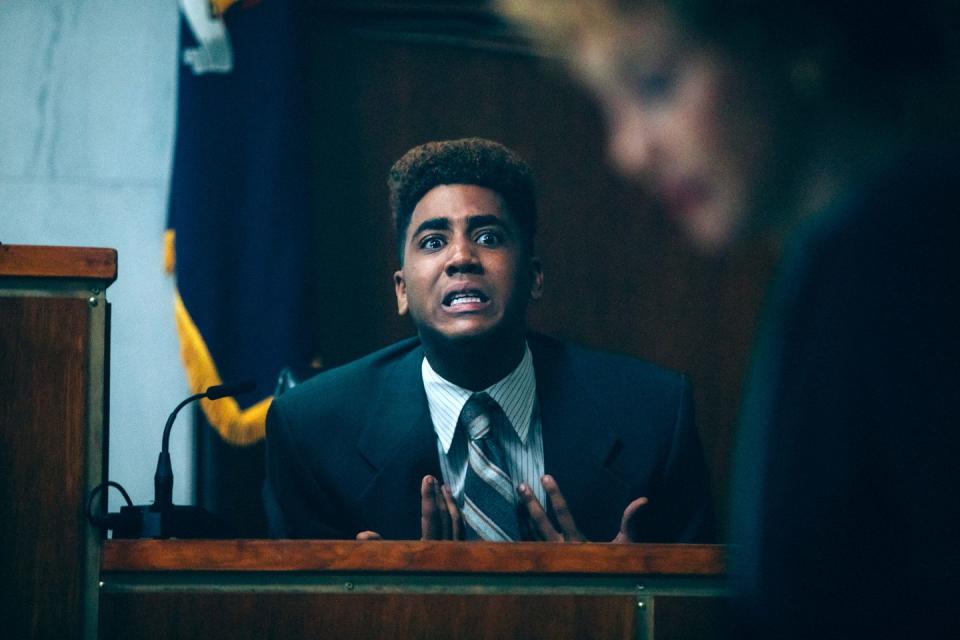Why Netflix and Ava DuVernay are being sued over When They See Us

With more TV choice than ever before, it's becoming increasingly difficult for creatives to spin their ideas into a cultural moment.
But When They See Us did just that.
The limited series, which was co-written and directed by Ava DuVernay (Selma, 13th) for Netflix, tells the story of the newly-christened Exonerated Five, previously recognised as the Central Park Five.
Kevin Richardson, Antron McCray, Yusef Salaam, Raymond Santana and Korey Wise were all wrongly convicted of the rape and assault of a woman in New York City back in 1989.
Twenty-eight year old Trisha Meili had been jogging through Central Park when she was brutally attacked and left in a coma, on the brink of death.

There was no physical evidence linking them to the case and the police interrogation, which took place without their parents and lasted for around seven hours, resulted in false confessions from all five.
Kevin, Antron, Yusef and Raymond spent between five and ten years inside a youth detention centre. Korey was sent to Rikers Island after being tried and sentenced as an adult, where he remained for 12 years.
"I would hear them beating up Korey Wise in the next room," Salaam told the Guardian in 2016.
"They would come and look at me and say: 'You realise you're next'.
"The fear made me feel really like I was not going to be able to make it out".
Matias Reyes, who was already serving time in prison for multiple rapes and murder, was the real culprit, eventually admitting to police that he was the one who had attacked Meili.
His DNA was a match with that found at the crime scene.
The five men, who had almost served their full sentences, were cleared of all charges and successfully sued the city of New York for $41m.

It's the series' portrayal of the interrogation technique used on the five which is at the centre of a new development surrounding Netflix and DuVernay.
The Reid Technique was developed by US company John E Reid and Associates and first taught to investigators in 1974.
The company provides training programmes and other services to the likes of the Federal Bureau of Investigation (FBI) and the Drug Enforcement Agency (DEA).
On the website, it's described as "a structured interviewing format" that uses "factual analysis, interview and interrogation" to evaluate "a person's truthfulness independent from a polygraph examination [lie detector test]".
The aim is to "help eliminate innocent suspects during an investigation, thereby allowing the investigator to focus on the person most likely to be guilty and to interrogate that individual in an effort to learn the truth".

Earlier this week, the company filed a federal lawsuit against both Netflix and DuVernay, arguing that the technique was defamed.
In the final episode, it is mentioned explicitly.
"You squeezed statements out of them after 42 hours of questioning and coercing, without food, bathroom breaks, withholding parental supervision," said Manhattan assistant district attorney Nancy Ryan. "The Reid Technique has been universally rejected."
Detective Michael Sheehan replied: "I don’t even know what the f**king Reid Technique is, OK? I know what I was taught. I know what I was asked to do and I did it."

The lawsuit states that "the conduct described [in the series] is not the Reid Technique...The programme falsely represents that squeezing and coercing statements from juvenile subjects after long hours of questioning without food, bathroom breaks or parental supervision is synonymous with the Reid Technique".
It goes on to state that it "does not involve and prohibits: striking or assaulting a subject, making any promises of leniency, denying a subject any rights, conducting excessively long interrogations, and denying a subject any physical needs".
Crucially, the technique "urges that extreme caution and care be taken when interviewing or interrogating juveniles or those with mental impairments".
Korey Wise struggled with hearing problems and a learning disability.
The company not only wants damages, but for When They See Us to be removed from Netflix until it "deletes the defamatory references" or removes them altogether.
Digital Spy reached out to Netflix for comment.

Back in 2017, consulting group Wicklander-Zulawski & Associates announced that it was stopping training its detectives in the method.
"Confrontation is not an effective way of getting truthful information," said company president and CEO, Shane Sturman (via Business Insider).
"More and more of our law enforcement clients have asked us to remove it from their training based on all the academic research showing other interrogation styles to be much less risky."
The company said that it would only use the technique to educate police on "the risk and reality of false confessions".
President of John E Reid & Associates, Joseph P Buckley, branded those claims "very misleading and disingenuous", adding that the technique is only confrontational when the evidence suggests that the suspect is guilty.
He also said that the technique regularly holds up in court.
The decision now lies with the US District Court for the Northern District of Illinois.
Digital Spy is launching a newsletter – sign up to get it sent straight to your inbox.
Want up-to-the-minute entertainment news and features? Just hit 'Like' on our Digital Spy Facebook page and 'Follow' on our @digitalspy Instagram and Twitter accounts.
You Might Also Like

 Yahoo News
Yahoo News 
